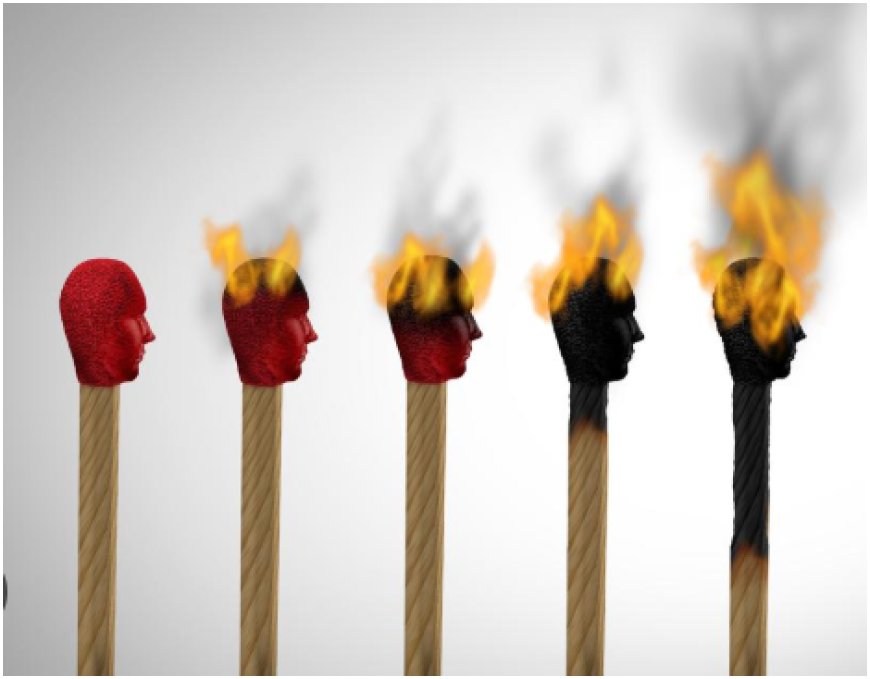Emotional burnout vs stress: Doctor explains how to tell the difference
Emotional burnout vs stress: Doctor explains how to tell the difference

Emotional burnout and stress are related but distinct concepts that can affect our mental and physical well-being.
While they may overlap in some symptoms, there are key differences between them. Here’s an explanation of how to tell the difference between emotional burnout and stress, as explained by doctors and mental health experts:
1. What is Stress?
Stress is a natural response to external pressures or challenges. It’s something everyone experiences at some point and can be motivating in short bursts, helping you get things done. Stress can come from work, personal relationships, financial difficulties, or other daily pressures.
Symptoms of Stress:
-
Feeling overwhelmed or anxious about tasks or situations.
-
Difficulty concentrating or focusing.
-
Physical symptoms, such as headaches, stomachaches, or muscle tension.
-
Emotional symptoms, like irritability, impatience, or feelings of frustration.
-
Stress is usually temporary and fades once the stressor is resolved or managed.
2. What is Emotional Burnout?
Emotional burnout, on the other hand, is a state of emotional, physical, and mental exhaustion that occurs after prolonged stress. It’s characterized by feelings of being drained, disconnected, and ineffective. Burnout typically happens after a long period of unresolved stress, often in work or caregiving roles, but it can occur in any area of life where one feels overextended.
Symptoms of Burnout:
-
Extreme fatigue, both physically and emotionally, that doesn’t improve with rest.
-
Feelings of detachment or apathy towards work or other responsibilities, even things that once felt meaningful.
-
Cynicism or negative thoughts, such as feeling like nothing you do matters or doubting your abilities.
-
Decreased performance or motivation, especially at work or in personal life.
-
Physical symptoms, like chronic headaches, sleep disturbances, or stomach problems.
-
Unlike stress, burnout often leads to complete disengagement or withdrawal from responsibilities.
Key Differences Between Stress and Burnout:
| Stress | Burnout |
|---|---|
| Stress is typically a short-term reaction to a specific situation. | Burnout is a long-term condition caused by prolonged stress and overwork. |
| Stress can be motivating and energizing in the short run. | Burnout leaves you feeling drained and unmotivated. |
| Stress can be linked to external pressures or demands. | Burnout is often a result of internal conflict, such as feeling unappreciated or overburdened. |
| Stress can be managed or resolved by taking breaks or changing the situation. | Burnout requires deep recovery, including lifestyle changes, seeking support, or professional help. |
How to Tell the Difference:
-
Duration and Intensity: Stress is often temporary and decreases once the external pressures are resolved. Burnout lasts longer and typically worsens over time without intervention.
-
Physical vs. Emotional: Stress affects both your mind and body, but burnout is more deeply emotional and psychological, with a loss of motivation and a sense of detachment from things you once cared about.
-
Recovery: If you’re stressed, rest, relaxation, and taking breaks may help you recover. Burnout, however, may require professional help, like therapy or counseling, and a more significant shift in lifestyle or mindset.
When to Seek Help:
If you’ve been experiencing prolonged feelings of burnout or stress that don’t seem to improve, or if they interfere with your daily life, it’s important to talk to a healthcare provider or a mental health professional. Addressing the root cause can help prevent further emotional and physical health problems.
Strategies to Combat Stress and Burnout:
If you find yourself dealing with stress, here are some strategies to help manage and reduce it:
-
Time Management: Organize tasks into manageable chunks, prioritize what’s urgent, and delegate when possible. Taking small steps can prevent you from feeling overwhelmed.
-
Relaxation Techniques: Practice relaxation methods such as deep breathing, meditation, yoga, or progressive muscle relaxation to help reduce the physical and emotional impact of stress.
-
Physical Activity: Exercise releases endorphins, which can boost your mood and relieve stress. Regular physical activity helps keep the body and mind in balance.
-
Social Support: Talk to a friend, family member, or colleague. Sharing your stressors with someone else can provide emotional relief and practical solutions.
-
Healthy Lifestyle Choices: Get enough sleep, eat a balanced diet, and stay hydrated. Avoiding excessive caffeine or alcohol, which can worsen stress, is important.
-
Set Boundaries: Learn to say "no" when necessary and establish healthy boundaries at work or in your personal life. Overcommitting can contribute to stress, so setting limits helps reduce pressure.
What's Your Reaction?
 Like
0
Like
0
 Dislike
0
Dislike
0
 Love
0
Love
0
 Funny
0
Funny
0
 Angry
0
Angry
0
 Sad
0
Sad
0
 Wow
0
Wow
0













































